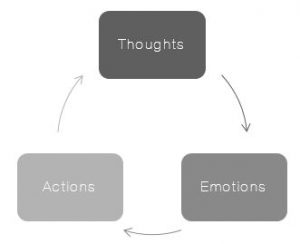What does the little voice inside YOUR head say?
Shakespeare said:
“There is nothing either good or bad, but thinking makes it so.”
The truth of this can be seen when we look at our self-talk patterns and the effect they are having on the body.
Your mind is the most powerful tool you have in living healthy. It is more powerful than exercise, food and any other thing you may have tried. Why? Because your mind controls everything you do.

The mind controls what we are unconsciously and consciously thinking. These thoughts spark emotions inside of us, which then drive our actions. Actions and behaviours then reinforce our initial thoughts, as well as new ones.
So the mind strongly influences the choices we make, and can actually play against us when trying to actively change behaviours, such as eating healthy and exercise habits for weight loss and fitness.
What is that Voice Inside My Head?
Ever feel like your mind is much like the movie “Inside Out“?
The voice you may sometimes hear in the background of your mind is called Self-Talk. It is an internal dialogue everyone has going in their head, reciting between 150 and 300 words a minute.
Some people hear their self-talk more than others. Self-talk messages are based on your current mood, and can be positive or negative.
Increased repetitiveness of self-talk messages usually indicates the importance of that message. This persistence can affect your responses, attitudes and behaviours.
Positive Self-Talk
Self-talk is actually one of the most effective forms of cognitive coping with setbacks in life, as long as it’s positive, with words like ‘want’, ‘can’ and ‘will’. When your voice inside your head is talking positively, it is considering bad things as temporary and seeing them as isolated. For example, “The weather caused it”, “That was a rough couple of hours”, and “That wasn’t so great, but I can do better next time.” It is also considering good things to be permanent changes, for example, “I’ve done well with this; now I know how to do it.”
Positive self-talk elevates:
- – mood
- – self-esteem
- – self-worth
- – self-confidence
- – mental toughness
- – effort put towards an activity
- – feelings of preparation
Positive self-talk also decreases anxiety and stress.
Negative Self-Talk
That voice inside your head always seems to have something negative to say. During negative self-talk we can often hear words like ‘can’t’, ‘sorry’, ‘should’, ‘must’, ‘hope’ and ‘maybe’. We seem to concentrate a lot on our mistakes, and immediately interpret criticisms and comments negatively.
We can tend to see all the bad things that happen to us as permanent, and frequently generalise them to other aspects of our lives, for example, “I screwed up again; I always screw up; I’m not good at anything.” We may also see the good things in life as temporary, for example, “Exercising is fun, for now; I’ll probably get over it soon.”
Negative self-talk can lead us to concentrate on mistakes, rather than what is needed to correct or improve performance, and negatively interpret criticisms and comments.
4 Ways to Encourage Positive Self-Talk
Here are 4 key strategies to counteract or change the negative messages being sent by your mind to be more positive:
- 1) reminding yourself of past, related events where you were successful in achieving something
- 2) reminding yourself of all the skills you have to perform well with
- 3) quickly interrupting thoughts with a verbal phrase like “I Reject It”, or a tactile reaction like flicking a rubber band on your wrist, then replacing the thought with something positive
- 4) daily practice of positive affirmations, such as “I am a strong, beautiful person and a great parent” or “I am doing a great job”
More on Affirmations
Affirmations are positive phrases or statements used to challenge negative or unhelpful thoughts. Practicing affirmations can be extremely simple, and all you need to do is pick a phrase and repeat it to yourself. They are designed to encourage an optimistic mindset – and optimism in itself is a powerful thing.
You may choose to use affirmations to motivate yourself, encourage positive changes in your life, or boost your self-esteem. If you frequently find yourself getting caught up in negative self-talk, positive affirmations can be used to combat these often subconscious patterns and replace them.
Affirmations require regular practice if you want to make lasting, long-term changes to the ways that you think and feel. There are, however, no hard and fast rules about timing or frequency when it comes to practicing affirmations.
Looking for some ideas to create your own affirmations? Here are some nice examples:
- – I choose to be happy
- – My life is taking place right here, right now
- – I’m gifted with and surrounded by amazing friends and family
- – I opt to rise above negative feelings and ditch negative thoughts
- – I am resilient, strong, and brave, and I can’t be destroyed
- – Nobody but me decides how I feel
- – When I lie down to sleep, everything is as it should be, and I rest content
- – I am in charge of my thoughts, and I don’t judge myself
- – I accept and love myself, thoroughly and completely
Remember! Your mind is a powerful machine, capable of influencing each emotion you feel and action you take in life. But reconfiguring the machine is not impossible; knowing how to do it and practicing regularly is the key to achieving your own healthy living goals.
If you need any help with creating a more confident, positive workforce, or would like to know more about our parent support programs, then please give us a call today on 0402 294 953. We’d love the opportunity to help!